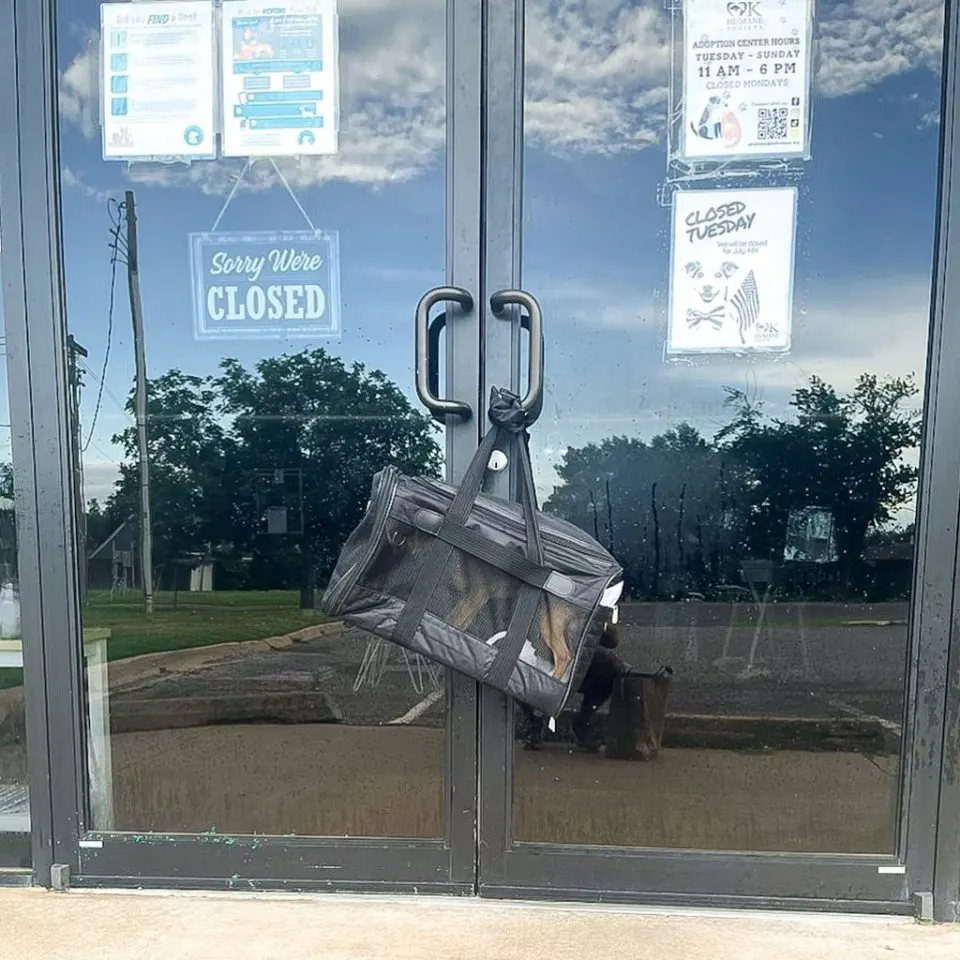It’s not unusual to see stray or abandoned dogs on the street. In fact, that happens almost too often these days.
Sure, sometimes it’s understandable when people can’t afford a dog, so they take him to a shelter in hopes of finding a better family for him.
In most cases, however, people are not that kind to dogs, and they will put them through a lot before just dumping them on the street.
What’s In The Bag

It was an ordinary day for Scott Lockard, who was just going to work at Oklahoma Humane Society, when he saw a black bag tied to the door handle of the center.
The man checked the bag and saw a small brown dog inside. This was not new for Scott, however, as he said to The Dodo:
This wasn’t the first time I have arrived at the adoption center to find animals waiting there, so I can’t say I was super surprised. I was happy to get her in and fed and watered, so I was mostly just thinking about getting the little dog comfortable.
After taking the dog in, he got to know her a little bit. She was a bit shy and reserved, but otherwise, she was a very healthy dog.
Scott checked the bag to see if the person who abandoned her had left something, and there was a note inside.
The note said: Her name is Maris, find her a good home.
It’s honestly sad seeing this note because it feels like the person who left him was well-intentioned and just wanted someone to help the dog because they couldn’t.
A Growing Problem

Either way, the humane society had decided to do something about the dogs in the centre, so they posted a message, along with the picture of Maris.
Oklahoma Humane Society marketing manager, Roshelle Anderson, told The Dodo: We didn’t post the photo to specifically call out the people who left the pet, but rather, to bring attention to a greater problem facing our community.
Currently, in the centre, there is a big problem with adoptions, as more and more dogs are abandoned, but not enough of them are adopted. This means that the shelter can barely afford to house them all.
The centre calls out to anyone who can help and maybe adopt a dog and bring him to his new home.

As for Maris, at the time of writing this article, she is still waiting for someone to come for her, but given how sweet and likable she is, there’s no doubt in my mind that someone will take her in
If you’ve noticed your furry friend’s nose running, it can be a concerning sight for any dog owner. As a seasoned dog trainer, you understand the importance of keeping a close eye on your pup’s health. A runny nose in dogs can be attributed to various factors, and it’s essential to be aware of the potential reasons behind this common issue.
Your four-legged companion’s nose serves as a vital tool for them, playing a significant role in their overall well-being. Understanding why your dog’s nose is running can help you ensure they are happy and healthy. So, let’s take a closer look at some of the possible causes behind this phenomenon and how you can best support your canine companion through it.
Understanding Why Your Dog’s Nose Is Running
Common Causes of Runny Noses in Dogs
Runny noses in dogs can be caused by various factors, similar to how we get them. One common reason is allergies. Your furry friend might be sensitive to pollen, mold, dust mites, or certain foods, leading to a runny nose. Infections, such as bacterial or viral, can also be culprits. These can result in nasal discharge that’s clear, yellow, or even bloody. Additionally, irritants like smoke or strong odors may trigger a runny nose in your dog.
When to Worry About a Runny Nose
If your dog’s nose is occasionally runny and they show no other symptoms, there’s usually no cause for alarm. However, if the discharge is persistent, thick, or discolored, it’s time to consult your vet. Watch out for other signs like sneezing, coughing, lethargy, or loss of appetite, as these could indicate a more serious issue. Keep an eye on your dog’s overall behavior and health to determine when a runny nose requires professional attention.
Examining the Symptoms
Identifying Allergies in Dogs
If your dog’s nose is running, it could be due to allergies. Just like humans, dogs can be allergic to various substances such as pollen, dust, or certain foods. Keep an eye out for other signs like itching, watery eyes, or skin issues to determine if allergies are the culprit behind your dog’s runny nose.
Signs of Respiratory Infections
A runny nose in dogs can also signal a respiratory infection. If your furry companion has a runny nose accompanied by coughing, sneezing, or even a fever, it might indicate a more serious problem like a respiratory infection. These infections can be caused by viruses, bacteria, or even fungi, so it’s crucial to consult your vet for proper diagnosis and treatment.
Diagnosis and Treatment
Veterinary Procedures for Diagnosis
When you take your pup to the vet for a runny nose, the first step is a physical examination. The vet will check your furry friend’s nose, throat, and ears. They might also run some tests like blood work or nasal swabs to determine the underlying cause.
Treatment Options for a Runny Nose
The treatment for your dog’s runny nose depends on the diagnosis. Allergies might require antihistamines or a change in diet. Antibiotics are usually prescribed for bacterial infections, while antifungal medications are used for fungal infections.
Always follow the veterinarian’s recommendations for medication dosage and administration. If the runny nose persists or worsens, contact your vet for further guidance.
Preventive Measures and Home Care
How to Keep Your Dog’s Nose Healthy
To maintain your furry friend’s nose health, you can follow some simple practices at home. Firstly, ensure your dog stays hydrated as proper hydration helps in preventing dryness of the nose. You can also use a humidifier in your home, especially during dry weather, to keep the air moist, which can help prevent nasal dryness. Regularly cleaning your dog’s living space and toys can also contribute to a healthier nose, as it reduces the chances of them inhaling irritants that may lead to nasal discharge. Additionally, providing a balanced diet rich in essential nutrients can boost your dog’s overall immune system and promote a healthy nose.
Home Remedies for Minor Nasal Discharge
In cases of minor nasal discharge, there are some simple home remedies you can try before seeking veterinary care. Steam therapy is one effective method where you can create a steam tent for your dog by clearing a small room and running a hot shower to fill the space with steam. Allowing your dog to inhale the steam for a few minutes can help clear their nasal passages. Another remedy is to ensure your dog is well-rested, as proper rest can aid in the healing process. You can also offer your dog some honey, known for its natural antiviral and antibacterial properties, to potentially ease minor nasal discomfort. However, if the nasal discharge persists or worsens, it is crucial to consult a veterinarian for proper diagnosis and treatment.
When to Seek Professional Help
Recognizing Emergencies
If your dog’s runny nose is accompanied by severe symptoms such as difficulty breathing, lethargy, persistent sneezing, or nasal discharge with blood, it’s crucial to seek immediate veterinary care. These signs could indicate a more serious issue that needs prompt attention from a professional to ensure your dog’s well-being.
Specialist Consultation for Chronic Conditions
For chronic or recurring nasal discharge, consulting a veterinary specialist may be necessary. Conditions like nasal tumors, fungal infections, or immune system disorders could cause persistent nasal issues in dogs. A specialist can conduct advanced diagnostic tests and provide specialized treatment plans tailored to your dog’s specific condition for effective management of chronic nasal disorders.
Conclusion
So there you have it – a rundown on why your furry friend’s nose might be running. Remember, keeping an eye on those symptoms is key to getting your pup the care they need. Whether it’s allergies, infections, or just a bit of irritation, a trip to the vet can help pinpoint the issue. By following the preventive tips and home care suggestions, you can help your doggo stay healthy and happy. And don’t forget, if things seem serious with symptoms like difficulty breathing or persistent sneezing, it’s best to seek immediate veterinary attention. Stay on top of your pup’s nose health, and you’ll both breathe easy!
Frequently Asked Questions
What are the common causes of a dog’s runny nose?
Common causes include allergies, infections, and irritants. Monitoring symptoms is crucial for timely veterinary care.
How can I identify if my dog has allergies or respiratory infections?
Examine symptoms carefully. Seek veterinary care for proper diagnosis through physical exams and tests.
What treatment options are available for a dog’s runny nose?
Treatment may include antihistamines, antibiotics, or antifungal medications based on the diagnosis.
How can I maintain my dog’s nose health at home?
Preventive measures include hydration, using a humidifier, cleaning living spaces, and providing a balanced diet.
Are there any home remedies for minor nasal discharge in dogs?
Yes, try steam therapy, rest, and honey. Consult a vet if symptoms persist or worsen.
When should I seek immediate veterinary care for my dog’s runny nose?
If severe symptoms like difficulty breathing, lethargy, or nasal discharge with blood occur, immediate veterinary attention is required.
What should I do for chronic or recurring nasal discharge in my dog?
Consult a veterinary specialist for advanced diagnostic tests and specialized treatment plans to manage chronic nasal disorders effectively.
[no_toc]

Hey there, I’m Janet Brooks, a dog-loving student from California. I’m all about helping pups in need, especially those without homes. Me and my awesome friends work together to give shelter and love to stray dogs. Oh, and I also write blogs about dogs to share helpful info.